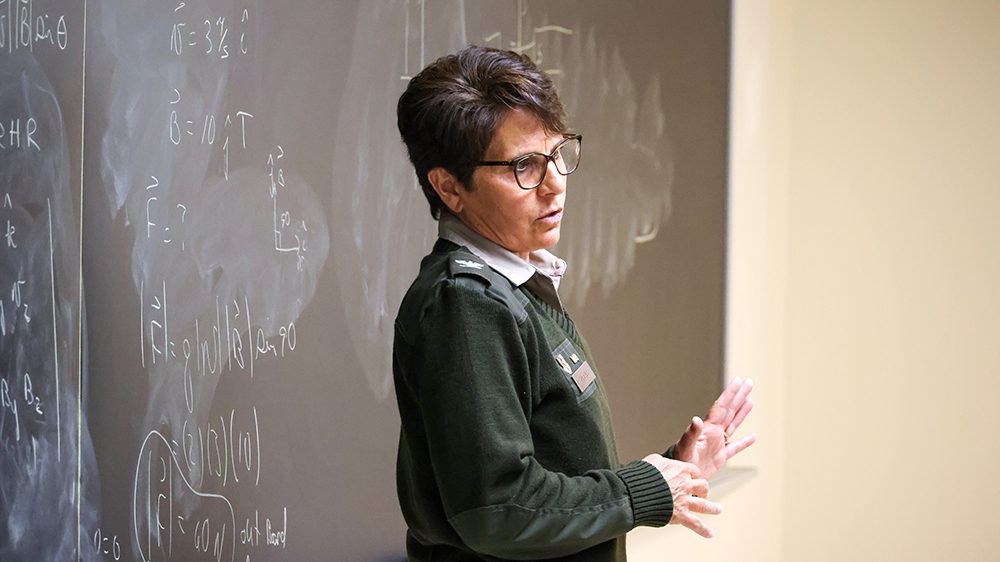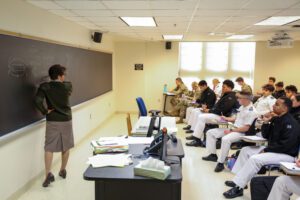Vargas: “The Best Job In The World”

Col. Stacia “Stacey” Vargas, Ph.D., Department of Physics and Astronomy head, teaches during the spring 2025 semester.—VMI Alumni Agencies Photo.

Col. Stacia “Stacey” Vargas, Ph.D., Department of Physics and Astronomy head, teaches during the spring 2025 semester.—VMI Alumni Agencies Photo.
When Col. Stacia “Stacey” Vargas, Ph.D., Department of Physics and Astronomy head, arrived at VMI in 1996, she was fresh out of graduate school at the University of Connecticut on a 1-year appointment. As she approaches three decades of teaching at the Institute, the obvious question is: Why did she decide to take the position? “Whenever I am asked this question,” Vargas replied, “I always give the same answer: The cadets! I had lunch with some of the 1st Class physics majors during my interview on post. I was immediately struck by their maturity, as well as their passion for the department and the Institute.”
She was also impressed by Institute’s clear commitment to the cadets, reflected in a strong emphasis on teaching and the attitudes of her prospective colleagues, such as William “Bill” Sauder ’55, Ph.D.; Phil Peters ’57, Ph.D., department head; and George Piegari (Hon), Ph.D. “They made it clear that VMI was a unique place,” Vargas said, “and they emphasized that my role would extend beyond teaching to include mentoring cadets and becoming an integral part of their cadetship.” So impressed by the department, the Institute, and most importantly, the cadets, Vargas turned down a tenure-track position at another institution and accepted VMI’s offer.
Since then, Vargas has seen a great many changes at VMI. For example, her first year of teaching was the last year before the admission of women. Besides the changes to the physical environment, she has seen many changes in the academic program. These include the abolition of the requirement that all rats take chemistry, the change of the electrical engineering department to the electrical and computer engineering department, and the establishment of the computer and information sciences department.
“Ironically,” she says, “while many things have changed, VMI remains fundamentally the same—a small institution that continues to prioritize teaching, mentoring, and cadet success.” She also appreciates the close-knit community of the Institute. “If a cadet is absent from class, I reach out to ensure everything is all right. The VMI faculty genuinely care about the cadets and their success, both at VMI and beyond.”
One change Vargas especially appreciates is the expansion of research opportunities for cadets. “Research is important because it allows cadets to explore unanswered questions. It encourages deeper thinking and learning, challenges their problem-solving skills, and most importantly, provides them the chance to work closely with a faculty mentor—and vice versa!”
She also values the benefits of the Summer Undergraduate Research Institute, one of which is ensuring cadets remain on post during the summer. “I don’t like VMI without cadets; it lacks the energy that only they can bring.”
According to Vargas, SURI creates an environment that is “a little more relaxed with fewer demands on cadets’ time, which allows them to really focus on the research.” It also fosters their creativity. “Some might think it is an odd word to use when talking about science, but it is true. Science involves creative thinking, and it is amazing to see cadets bring their creativity and problem solving to a project.”
Vargas also observes that some cadets truly thrive in the laboratory. “In some cases, a cadet might not be as enthusiastic about classroom work, but they prove to be exceptional at research.”

Although Vargas considers all cadets special, one stands out: Her daughter, Maria Vargas ’22. When asked about her initial reaction to her daughter’s interest in attending VMI, she responded, “Being familiar with the cadet experience, I know you have to truly want a VMI education. So, it was important for me to step back and allow her to explore VMI on her own and make the final decision herself.”
Maria studied civil engineering and played soccer for 4 years. She also made a conscious effort to distance herself from her mother at VMI. Vargas laughed, “We did our best to avoid each other, but for a good reason—so she could have her own journey through VMI.
“It was a great experience for her,” Vargas continued, “and she really made the most of the opportunities VMI provided to help her develop as a leader.” Maria is now an officer in the U.S. Navy Civil Engineering Corps (known as the Seabees).
At VMI, Vargas recently started teaching a course designed to help cadets make the most of another opportunity: Competing for a slot in the U.S. Navy’s prestigious Nuclear Power Program. In 2023, Col. Travis Homiak ’95, then-professor of naval science, approached Vargas with a challenge. He wanted to find a way to increase the success rates for VMI cadets in the demanding interview the Navy requires of every candidate for the program. Throughout her career, she has been helping cadets prepare for the interview on an individual basis and so she understood what they needed to be successful. “Many of the questions pertained to concepts covered in general physics and calculus. Cadets preparing for the interview benefit from a comprehensive review of those concepts. They also needed to improve their problem-solving skills and their ability to think on their feet.”
The solution? The creation of a one-credit course, problem solving in physics, offered in the fall semester. “While not all cadets preparing for the interview can fit the course in their schedule, the majority do.” Vargas continues to help some cadets prepare on a one-on-one basis.
The results? “The feedback from the cadets and the naval science department has been uniformly positive. And, this past year, VMI cadets enjoyed a 100% pass rate.”
Just as partnerships between departments on post provide numerous benefits for cadets, so does the partnership between the Department of Physics and Astronomy and its donors. “We are immensely grateful for the support we receive from our alumni. It makes a dramatic difference for our department. For instance, physics majors from the Class of 1966 helped establish what is now known as the Mallory Circle Fund. The funds from it directly support the department, enabling us to send cadets to conferences and field trips, assist them in publishing their research, provide department awards, and much more. We are also fortunate to have the Cameron Chair in Physics and Astronomy and the Cameron Funds, both of which contribute to the strength of the department.”
Someone who has taught at VMI for almost 30 years certainly has developed some insights into the Institute. Asked what makes VMI a special place, Vargas responded, “Its focus on the cadets. Whenever someone comes for a job interview here, I am honest with them about our expectations and make it clear that our focus—in our department and throughout the academic program—is on teaching and mentoring.”
She continued, “I also make it a point to describe the rewards of teaching here. Cadets are amazing young men and women who choose a more challenging educational path than their peers do. They value honesty, accountability, and integrity and are committed and engaged. It is amazing to watch the transition from anxious rats to self-confident and self-aware 1st Class cadets. I feel fortunate to be part of that 4 years of growth.
“And, quite honestly, I tell job candidates, if they join us, they’ll soon consider themselves to be very spoiled to be teaching at VMI.” She paused. “Who knows? In time, they might think of teaching at VMI as I do: As the best job in the world.”

The communications officer supports the strategy for all communications, including web content, public relations messages and collateral pieces in order to articulate and promote the mission of the VMI Alumni Agencies and promote philanthropy among varied constituencies.